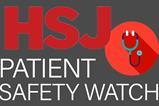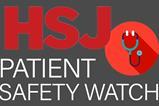HSJ is now hosting the Patient Safety Watch newsletter, written by Patient Safety Watch chief executive James Titcombe.
Good afternoon and welcome to the latest edition of the Patient Safety Watch newsletter.
Since our last edition, international events have deeply shocked us all. Before getting into the usual patient safety content, it feels appropriate to take a moment to acknowledge the dreadful happenings in the Middle East and to extend thoughts and sympathy for any readers affected by recent and ongoing events.
UK maternal mortality increases and inequalities persist
A new report from MBRRACE-UK has revealed the UK’s maternal death rate has risen by 15 per cent over the last 10 years, with suicide continuing to be the leading direct cause of death between six weeks and 12 months after the end of pregnancy.
Black women and birthing people remain four times more likely to die, and Asian women twice as likely to die, than white women during and shortly after pregnancy.
Commenting on the report’s findings, Royal College of Midwives chief executive Gill Walton said: “All maternal healthcare should be equal, regardless of race, religion or background. All of us involved in maternity care… must do more to understand and address the difference in outcomes for Black and Asian women and those from the most deprived backgrounds… A whole-system approach is the only way we can close this gap.”
Tommy’s chief executive Kath Abrahams said: “The maternal mortality rate continues to increase despite the repeated and increasingly desperate calls – from parents, midwives and other health professionals, and organisations in the pregnancy and baby sector – for the government to take action to improve care and services. The quality of care given to pregnant women and people in the UK is not improving – it is getting worse.”
Earlier this year, data from MBRRACE-UK confirmed stillbirth rates increased for the first time in seven years to 3.53 per 1,000 live births in 2021, from 3.33 in 2020. The data also highlighted shocking inequalities with babies of black mothers more than twice as likely to be stillborn as white infants and outcomes for women in deprived areas significantly worse than more affluent areas.
Taken together, this latest data is deeply concerning – much more must be done to address these shocking inequalities and the wider systemic issues affecting the quality and safety of maternity care.
Patients to receive latest valproate safety information with every pack
Valproate-containing medicines must now be dispensed in the manufacturer’s original full pack, following regulatory changes that came into effect this Wednesday.
It means patients will always receive specific safety warnings and pictograms, including a patient card and the patient information leaflet, which are contained in the manufacturer’s original full pack. These materials form a key part of the safety messaging and alert patients to the risks to the unborn baby if valproate-containing medicines are used in pregnancy.
This change has only come about due to brilliant and determined campaigning from Emma Murphy and Janet Williams. Amazing work and a true demonstration of the power of patients to make a difference.
NHSE steps in with warning to union
NHS England has written to the British Medical Association to warn the ongoing string of doctors’ strikes was “causing significant disruption and risk to patients”, including to those needing urgent heart and cancer treatment.
The letter came earlier this month as junior doctors and consultants were in the middle of a joint strike, having agreed to provide “Christmas Day” cover only.
The letter, signed by NHSE leaders including chief medical officer Sir Stephen Powis and chief nurse Dame Ruth May, read: “We are extremely concerned that Christmas Day cover is insufficient to ensure appropriate levels of patient safety are being maintained across local health systems.”
Nurse found guilty of sedating patients to ‘keep them quiet’
A nurse is facing jail after being found guilty of drugging patients with sedatives to “keep them quiet” for an “easy life”.
As reported by several outlets, including the Guardian and BBC News, Catherine Hudson gave two patients sedatives during shifts at Blackpool Victoria Hospital’s stroke unit between February 2017 and November 2018. Jurors at Preston Crown Court also convicted the 54-year-old of conspiring with a junior colleague, Charlotte Wilmot, 48, to administer a sedative to a third patient, although Ms Hudson was cleared of mistreating two other patients.
The court also heard how Ms Hudson wrote a text claiming she had sedated a patient “within an inch of her life”, adding: “Bet she’s flat for a week, ha ha.”
Tens of thousands of patient letters unsent
BBC News reported late last month that Newcastle Hospitals Foundation Trust had failed to send out 24,000 letters to patients and GPs, dating back to 2018, because they had been saved to a computer folder not known about by the senior consultants who were supposed to sign them off.
Then, it emerged Nottingham University Hospitals Trust had previously had a similar problem, having failed to send more than 400,000 letters, triggering a serious incident in 2017.
NUH chief executive Anthony May said an investigation had taken place in 2017, which did not identify any significant patient harm. However, he added the trust would be carrying out a review of that original investigation in an effort to put patients’ and the public’s minds at rest.
Nursing safe staffing tool gets an update
According to the Nursing Times, a tool used to work out safe staffing levels for nurses has been updated. The latest version of the Safer Nursing Care Tools for adult inpatient wards and adult assessment units now includes additional supporting resources and guidelines for different ward layouts.
Safer Nursing Care Tool steering committee chair Janice Sigsworth said: “Having the right nurse staffing levels is fundamental to providing safe and high-quality patient care, as well as creating a positive work practice environment for staff.
“The Safer Nursing Care Tools already underpin the way in which NHS trusts plan their nursing workforce needs and the updated adults’ inpatient wards and acute assessment unit tools reflect the changing needs of our patients.”
Martha’s rule – an international perspective
Inspirational US patient safety campaigner Helen Haskell has written an important and insightful commentary about Martha’s rule for the British Medical Journal.
The piece looks at international experience and outlines some principles for creating an effective family-activated system, as well as addressing some of the concerns some providers have expressed, including that Martha’s rule may divert resources.
She writes: “This is not a new argument. But, as Martha’s case shows, the recurring problems of hierarchy, arrogance, and poor culture have not been tackled despite what now amounts to decades of effort.
“It is not the job of patients and families to wait around for healthcare providers to sort out their culture. Patients, the reason for the system’s existence, should have the agency to try to save their own lives. It may be that this spark of accountability is what is needed to bring openness to a system that has so far resisted it.”
Sharing some good stuff…
The Maternity Consortium is hosting a free virtual event sharing examples of good practices from local maternity and neonatal systems working in partnership with voluntary community and social enterprise organisations and maternity and neonatal voices partnerships to implement their equity and equality plans. The event will also include a national update on the equity and equality plans from NHSE and an opportunity to network with colleagues in breakout rooms. More information and how to register here.
Just Culture… Revisited
If you have an interest in patient safety and you’re not already familiar with HindSight magazine, a free resource published by EUROCONTROL, you’ve been missing out! The latest edition is on the theme of Just Culture…Revisited and includes a diverse set of articles from a diverse set of authors in the context of aviation, maritime, rail and healthcare. Particular highlights for me include these articles from Suzette Woodward and Steven Shorrock, but there’s much more great content to explore, much highly relevant to healthcare. Please take a look.
Celebrating Maternity Unit Marvels
The charity Baby Lifeline has announced the winners of its 2023 UK MUM (Maternity Unit Marvels) Awards.
With so much worrying news about maternity services, it’s great to share some positive stories of maternity professionals and teams who have been nominated by families and recognised for providing compassionate and life-saving care.
A star-studded judging panel, including Dame Ruth May and Donna Ockenden, selected the regional winners and an overall national winner: United Lincolnshire Hospitals Trust – community midwife and obstetric consultant.
The awards give parents, guardians and families the chance to say thank you to the team of professionals who made the birth of their child possible.
A quick mention also to Baby Lifeline’s chief executive Judy Ledger, who collected her MBE earlier this month. Not all honours are deserved, but this one for Judy – whose incredible work has supported safer maternity care for more than 40 years – certainly is.
Baby Loss Awareness Week 2023
This newsletter goes to press as we approach the end of Baby Loss Awareness Week 2023.
Baby loss can be a difficult subject to talk about. I know from my own experience that even close and caring friends and family members can struggle to know how to approach the subject. Consequently, it’s an issue that can sometimes feel hidden and a place that can sometimes feel very lonely and isolated for those affected.
Baby Loss Awareness Week is a great opportunity to help change this and a way of bringing anyone touched by pregnancy and baby loss together in a safe and supportive way to share their experiences and feel they are not alone.
Wave of Light
The end of Baby Loss Awareness Week (15 October at 7pm) is marked with a special event called #WaveOfLight. It’s an opportunity to light a candle of remembrance and share a photo or message on social media. I’ll be taking part and always find the outpouring of kindness and support a comfort.
If you have been affected by baby loss, please take care of yourself this week and remember you are not alone. If you need support, the SANDS website has information about help and support available.
That’s all for this edition. Look out for our next newsletter which comes out on 27 October. In the meantime, thanks for reading and please stay safe.
James Titcombe
































No comments yet